by Andrew Kohut, President, Pew Research Center
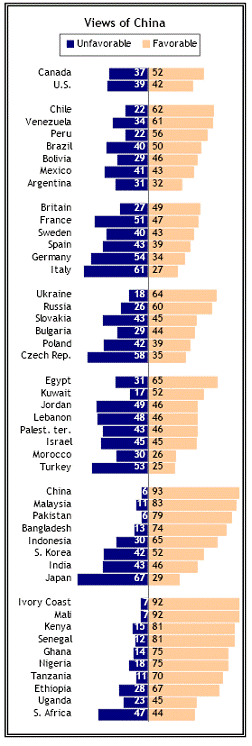 The rise of anti-Americanism in recent years has given China a decided image advantage over the United States. Considerably more people around the world have an unfavorable view of the America than think poorly of China. But signs in Pew’s polling suggest that perceptions of China’s increasing power – both military and economic – could boost anti-Chinese sentiment in years to come. In fact, there are some signs that this has already begun to occur in Western Europe where worries about China’s economic power are on the rise.
The rise of anti-Americanism in recent years has given China a decided image advantage over the United States. Considerably more people around the world have an unfavorable view of the America than think poorly of China. But signs in Pew’s polling suggest that perceptions of China’s increasing power – both military and economic – could boost anti-Chinese sentiment in years to come. In fact, there are some signs that this has already begun to occur in Western Europe where worries about China’s economic power are on the rise.
Our most recent reading of attitudes toward China among countries around the world comes at a time of widespread discontent with virtually all of the “powers that be.” Not surprisingly, this year’s Pew Global Attitudes survey found global opinions of China mixed.1 The same, of course, is true of opinions of the United States. But what is most striking is that the publics of more countries dislike America than dislike China.
In 27 of the 46 nations plus the Palestinian Territories covered by the survey, the balance of opinion regarding China is decidedly favorable; in just five countries are views of China significantly more negative than positive. By comparison, the balance of opinion about the United States is favorable in 25 of the 47 countries; but views of America are decidedly negative in many more countries – half or more of the publics in 18 countries express disapproving views of the United States.
China’s fans are most prevalent in the neighboring Asian countries of Malaysia (83% favorable), Pakistan (79%), Bangladesh (74%), Indonesia (65%), as well as in most African countries (92% favorable in both Ivory Coast and Mali and between 67% and 81% in Kenya, Senegal, Ghana, Nigeria, Tanzania and Ethiopia).
Still, some Asian publics express mixed feelings about their relationship with China. In Indonesia, for example, a 43% plurality calls China’s growing military power a “bad thing,” but 66% applaud China’s growing economy. In South Korea, a small majority (52%) say it looks favorably on China but substantial majorities worry about its growing military and economic power.
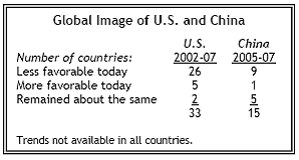 Negative views of China are especially strong in Japan, where 67% say they have a generally unfavorable view of China while an even larger majority (80%) disapproves of China’s expanding military strength. Several European countries also cast a worried eye on the Middle Kingdom with majorities in Italy (61%), the Czech Republic (58%), Germany (54%), France (51%) as well as Turkey (53%) saying they hold an unfavorable view of China.
Negative views of China are especially strong in Japan, where 67% say they have a generally unfavorable view of China while an even larger majority (80%) disapproves of China’s expanding military strength. Several European countries also cast a worried eye on the Middle Kingdom with majorities in Italy (61%), the Czech Republic (58%), Germany (54%), France (51%) as well as Turkey (53%) saying they hold an unfavorable view of China.
A Downward Trend
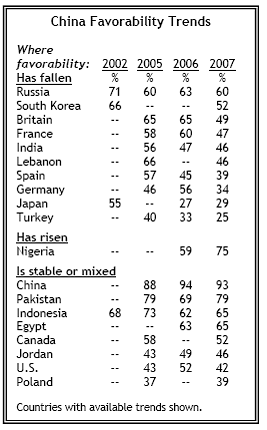 While global opinion of China remains mostly positive, it has soured somewhat in recent years – though not as widely as have attitudes toward the United States. In 9 of 15 countries for which trend data are available, the proportion of the public saying it views China favorably has shrunk over the past 2 years. The largest declines are observed among of China’s Asian neighbors (Japan, South Korea, and India), but significant slippage is also seen in Western Europe (Britain, France, Germany, Spain).
While global opinion of China remains mostly positive, it has soured somewhat in recent years – though not as widely as have attitudes toward the United States. In 9 of 15 countries for which trend data are available, the proportion of the public saying it views China favorably has shrunk over the past 2 years. The largest declines are observed among of China’s Asian neighbors (Japan, South Korea, and India), but significant slippage is also seen in Western Europe (Britain, France, Germany, Spain).
(Interestingly, for reasons not apparent from these data, the English-speaking countries covered by the survey — Great Britain, Canada, and even to a lesser extent the United States — have decidedly more favorable overall views of China than do non-English-speaking Western nations.)
Moreover, even in countries where overall impressions of China remain positive, growing numbers worry about its heightened military power and, to a lesser extent, its mounting economic power.
In 32 of 46 countries surveyed, China’s increasing military muscle is viewed with alarm. These worries are most prevalent in two countries with a long and sometimes bitter historic connection to China: South Korea, where fully 89% view Chinese military might as a bad thing and Japan where 80% share that view.
In neighboring India, a clear majority (59%) also expresses concern about China’s military power as do 70% of Russians. On the other hand, majorities in Pakistan (57%), Malaysia (57%), and Bangladesh (51%) say China’s stronger military is good for their country.
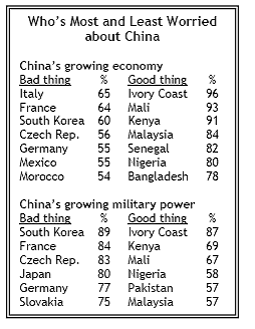 China’s rapidly expanding economy attracts far less concern. In fact, in 33 of 46 countries, including China itself, China’s growing economy is viewed as a good thing by majorities or pluralities. Nonetheless, concern is significant and increasing in such varied countries as Italy, France, South Korea, the Czech Republic, Germany, Mexico and Malaysia
China’s rapidly expanding economy attracts far less concern. In fact, in 33 of 46 countries, including China itself, China’s growing economy is viewed as a good thing by majorities or pluralities. Nonetheless, concern is significant and increasing in such varied countries as Italy, France, South Korea, the Czech Republic, Germany, Mexico and Malaysia
Nearly all of China’s neighbors see what’s good for the Chinese economy as good for their own. Two neighbors stand apart in this however: In South Korea, a substantial 60% majority sees China’s growing economic power as a bad thing. In India, views are more evenly divided, with 42% calling China’s growing economy a good thing and 48% deeming it bad.
China’s Influence Spreads to Other Continents
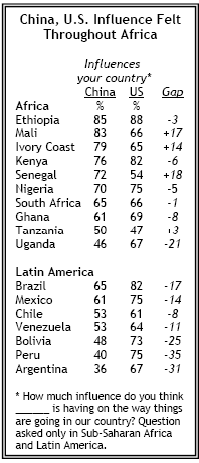 China’s growing presence on the world stage is clearly evident in Africa and Latin America. Majorities in most countries in each of these regions say China exerts at least a fair amount of influence on their countries.
China’s growing presence on the world stage is clearly evident in Africa and Latin America. Majorities in most countries in each of these regions say China exerts at least a fair amount of influence on their countries.
In eight of 10 sub-Saharan African countries surveyed, majorities say that China has a “great deal” or a “fair amount” of influence on the way things are going in their countries. And in four of seven Latin American countries majorities also say the same thing about China’s influence on their countries.
In Africa, China’s influence is now seen as rivaling American influence. In such major nations as Ethiopia, South Africa, and Nigeria, equally huge numbers see America and China exerting an important influence in their countries.
Ghana, Uganda and Kenya still rate American influence more potent in their nations. But in Senegal, Mali, and Ivory Coast, greater numbers say China has an important influence than say the same about the United States.
Most striking is that while clear majorities in 8 of 10 sub-Saharan African nations surveyed say that America’s influence in their countries is generally good, China’s influence is almost universally viewed as having a more beneficial impact on African countries than does that of the United States.
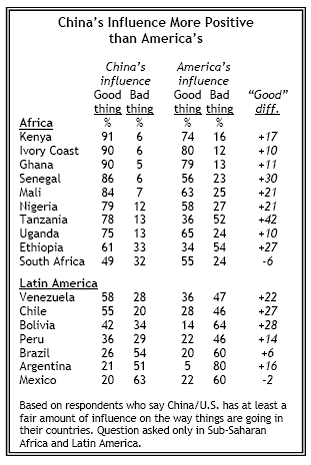 In Latin America, U.S. dominance is less challenged by China’s rise to world power. In all seven Latin American nations surveyed, larger numbers see an important U.S. influence than say the same about China. In most of these countries the difference is substantial, ranging from 35 percentage points in Peru and 31 points in Argentina down to 8 points in Chile.
In Latin America, U.S. dominance is less challenged by China’s rise to world power. In all seven Latin American nations surveyed, larger numbers see an important U.S. influence than say the same about China. In most of these countries the difference is substantial, ranging from 35 percentage points in Peru and 31 points in Argentina down to 8 points in Chile.
Reactions to the influence of both China and the United States are far less positive in Latin American than in Africa, but views are divided across nations.
In Venezuela, Chile, Bolivia and Peru, majorities or pluralities rate China’s influence as good, while the reverse is true with respect to the United States. In Brazil, Mexico and Argentina, the influence of both countries is generally regarded unfavorably — in some cases by large majorities (80% of Argentineans take a dim view of American influence there.)




